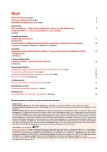DPP-4-inhibitors – What are the similarities, where are the differences?
Authors:
Matthias Blüher
Authors place of work:
Lekárska fakulta, Lipská univerzita, Lipsko, Nemecko, a Univerzitná nemocnica Lipsko, III. interná klinika, oddelenie endokrinológie a nefrológie, Lipsko, Nemecko
Published in the journal:
Forum Diab 2012; 1(1): 9-16
Category:
Hlavná téma
Summary
With the increasing prevalence of type 2 diabetes and its complications throughout the world, there is a need for efficient and safe therapeutic strategies. The dipeptidyl peptidase-4 (DPP-4) inhibitors have become important oral glucose lowering drugs for the management of patients with type 2 diabetes. All DPP-4-inhibitors act on the incretin system to lower hyperglycemia, have a similar safety profile, are well tolerated, do not cause significant weight gain and have a relatively low risk of hypoglycemia. However, there are clinical differences among the four agents, sitagliptin, vildagliptin, saxagliptin, and linagliptin which are currently approved by the US Food and Drug Administration or the European Medicines Agency. This review article discusses similarities and differences in efficacy, safety and tolerability of these four DPP-4-inhibitors.
Key words:
DPP-4-inhibitors – vildagliptin – sitagliptin – saxagliptin – linagliptin – type 2 diabetes – incretin system – GLP-1
Zdroje
1. Drucker DJ, Nauck MA. The incretin system: glucagon-like peptide-1 receptor agonists and dipeptidyl peptidase-4 inhibitors in type 2 diabetes. Lancet 2006; 368(9548): 1696–1705.
2. Nauck MA. Incretin-based therapies for type 2 diabetes mellitus: properties, functions, and clinical implications. Am J Med 2011; 124(Suppl 1): S3–S18.
3. Holst JJ, Gromada J. Role of incretin hormones in the regulation of insulin secretion in diabetic and nondiabetic humans. Am J Physiol Endocrinol Metab 2004; 287(Suppl 2): E199–E206.
4. Lotfy M, Singh J, Kalász H et al. Medicinal Chemistry and Applications of Incretins and DPP-4 Inhibitors in the Treatment of Type 2 Diabetes Mellitus. Open Med Chem J 2011; 5(Suppl 2): 82–92.
5. Farilla L, Bulotta A, Hirshberg B et al. Glucagon-like peptide 1 inhibits cell apoptosis and improves glucose responsiveness of freshly isolated human islets. Endocrinology 2003; 144(12): 5149–5158.
6. Buteau J, El-Assaad W, Rhodes CJ et al. Glucagon-like peptide-1 prevents beta cell glucolipotoxicity. Diabetologia 2004; 47(5): 806–815.
7. Brubaker PL, Drucker DJ. Minireview: Glucagon-like peptides regulate cell proliferation and apoptosis in the pancreas, gut, and central nervous system. Endocrinology 2004; 145(6): 2653–2659.
8. Karagiannis T, Paschos P, Paletas K et al. Dipeptidyl peptidase-4 inhibitors for treatment of type 2 diabetes mellitus in the clinical setting: systematic review and meta-analysis. BMJ 2012; 344: e1369.
9. Bergman AJ, Cote J, Yi B et al. Effect of renal insufficiency on the pharmacokinetics of sitagliptin, a dipeptidyl peptidase-4 inhibitor. Diabetes Care 2007; 30(7): 1862–1864.
10. Heise T, Graefe-Mody EU, Hüttner S et al. Pharmacokinetics, pharmacodynamics and tolerability of multiple oral doses of linagliptin, a dipeptidyl peptidase-4 inhibitor in male type 2 diabetes patients. Diabetes Obes Metab 2009; 11(8): 786–794.
11. Ahren B, Pacini G, Tura A et al. Improved meal-related insulin processing contributes to the enhancement of B-cell function by the DPP-4 inhibitor vildagliptin in patients with type 2 diabetes. Hormone Metab Res 2007; 39(11): 826–829.
12. Balas B, Baig MR, Watson C et al. The dipeptidyl peptidase IV inhibitor vildagliptin suppresses endogenous glucose production and enhances islet function after single dose administration in type 2 diabetic patients. J Clin Endocrinol Metab 2007; 92: 12249–12255.
13. Azuma K, Rádiková Z, Mancino J et al. Measurements of islet function and glucose metabolism with the dipeptidyl peptidase 4 inhibitor vildagliptin in patients with type 2 diabetes. J Clin Endocrinol Metab 2008; 93(2): 459–464.
14. Thomas L, Eckhardt M, Langkopf E et al. (R)-8-(3-amino-piperidin-1-yl)-7-but-2-ynyl-3-methyl-1-(4-methyl-quinazoli n-2-ylmethyl)-3,7-dihydro-purine-2,6-dione (BI 1356), a novel xanthine-based dipeptidyl peptidase 4 inhibitor, has a superior potency and longer duration of action compared with other dipeptidyl peptidase-4 inhibitors. J Pharmacol Exp Ther 2008; 325(1): 175–182.
15. Scheen AJ. Pharmacokinetics of dipeptidylpeptidase-4 inhibitors. Diabetes Obes Metab 2010; 12(8): 648–658.
16. Cox ME, Rowell J, Corsino L et al. Dipeptidyl peptidase-4 inhibitors in the management of type 2 diabetes: safety, tolerability, and efficacy. Drug Healthc Patient Saf 2010; 2(1): 7–19.
17. Baetta R, Corsini A. Pharmacology of dipeptidyl peptidase-4 inhibitors: similarities and differences. Drugs 2011; 71(11): 1441–1467.
18. Lukashevich V, Schweizer A, Shao Q et al. Safety and efficacy of vildagliptin versus placebo in patients with type 2 diabetes and moderate or severe renal impairment: a prospective 24-week randomized placebo-controlled trial. Diabetes Obes Metab 2011; 13(10): 947–954.
19. Ito M, Abe M, Okada K, Sasaki H, Maruyama N, Tsuchida M, Higuchi T, Kikuchi F, Soma M. The dipeptidyl peptidase-4 (DPP-4) inhibitor vildagliptin improves glycemic control in type 2 diabetic patients undergoing hemodialysis. Endocr J 2011; 58(11): 979–987.
20. Aroda V et al. Poster Presentation 836. Presented at: 46th Scientific Sessions of the European Association for the Study of Diabetes; September 20–24, 2010; Stockholm, Sweden.
21. Marfella R, Barbieri M, Grella R et al. Effects of vildagliptin twice daily vs. sitagliptin once daily on 24-hour acute glucose fluctuations. J Diabetes Complications 2010; 24(2): 79–83.
22. Krinsley JS. Glycemic variability and mortality in critically ill patients: the impact of diabetes. J Diabetes Sci Technol 2009; 3(6): 1292–1301.
Štítky
Diabetologie Endokrinologie Interní lékařstvíČlánek vyšel v časopise
Forum Diabetologicum

2012 Číslo 1
Nejčtenější v tomto čísle
- Inhibítory DPP-4 – v čom sú si podobné a v čom sa líšia?
- Čo má nasledovať po metformíne?
- Diabetická retinopatia 1
- Miroslav Souček et al. Vnitřní lékařství
